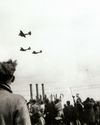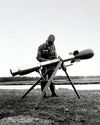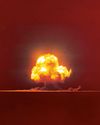
The end of hostilities in 1945 was not accompanied by a sudden disappearance of the threat posed by the sea mine. It is estimated that around 300,000 of these deadly devices continued to lurk in the depths at the war’s conclusion. Oblivious to VE Day and VJ Day celebrations, they remained infesting the waters surrounding the UK, North Sea, Baltic, Mediterranean, Sea of Japan and elsewhere.
Consequently there was to be no respite for the Allies’ minesweepers as a massive effort was needed to clear up the extensive minefields that threatened the resumption of peacetime maritime trade. Nor was the effort confined to the Allies: their former German and Italian adversaries were also soon back at sea – under close supervision – sweeping the tens of thousands of mines that lay off their coastlines. The German effort was controlled by the German Mine Sweeping Administration (GMSA), headed by a Royal Navy (RN) officer. It comprised nearly 27,000 sailors and 300 boats and operated until 1948, only ceasing due to Soviet concerns over it becoming a cadre for a future West German Navy.
Around Japan, some 60,000 mines were estimated to remain off ports, coastlines and in key shipping lanes. To counter these, the Imperial Japanese Navy (IJN) was directed – in Occupation General Order Number 1 – to ensure all mines, minefields and obstructions were cleared. To achieve this, a Minesweeping Bureau was formed to oversee a force of 10,000 IJN sailors and 385 minesweeping vessels.
This story is from the {{IssueName}} edition of {{MagazineName}}.
Start your 7-day Magzter GOLD free trial to access thousands of curated premium stories, and 9,000+ magazines and newspapers.
Already a subscriber ? Sign In
This story is from the {{IssueName}} edition of {{MagazineName}}.
Start your 7-day Magzter GOLD free trial to access thousands of curated premium stories, and 9,000+ magazines and newspapers.
Already a subscriber? Sign In

NAUMACHIA TRUTH BEHIND ROME'S GLADIATOR SEA BATTLES
In their quest for evermore novel and bloody entertainment, the Romans staged enormous naval fights on artificial lakes

OPERATION MANNA
In late April 1945, millions of Dutch civilians were starving as Nazi retribution for the failed Operation Market Garden cut off supplies. eet as In response, Allied bombers launched a risky mission to air-drop food

GASSING HITLER
Just a month before the end of WWI, the future Fuhrer was blinded by a British shell and invalided away from the frontline. Over a century later, has the artillery brigade that launched the fateful attack finally been identified?

SALAMANCA
After years of largely defensive campaigning, Lieutenant General Arthur Wellesley went on the offensive against a French invasion of Andalusia

HUMBERT 'ROCKY'VERSACE
Early in the Vietnam War, a dedicated US Special Forces officer defied his merciless Viet Cong captors and inspired his fellow POWs to survive

LEYTE 1944 SINKING THE RISING SUN
One of the more difficult island campaigns in WWII's Pacific Theatre saw a brutal months-long fight that exhausted Japan’s military strength

MAD DAWN
How technology transformed strategic thinking and military doctrine from the Cold War to the current day

BRUSHES WITH ARMAGEDDON
Humanity came close to self-annihilation with the Cuban Missile Crisis, Broken Arrows’ and other nuclear near misses

THE DEADLY RACE
How the road to peace led to an arms contest between the USA and USSR, with prototypes, proliferation and the world’s biggest bomb

THE MANHATTAN PROJECT
Einstein, Oppenheimer and the race to beat Hitler to the bomb. How a science project in the desert helped win a war